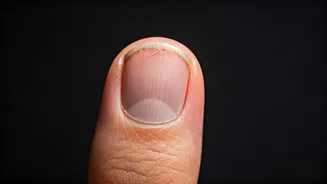Germs Galore
Nail-biting exposes your body to a host of germs and bacteria. Your hands are constantly in contact with various surfaces, picking up microbes that can
cause illness. When you bite your nails, these germs get a free pass into your mouth, increasing your chances of infections like colds, flu, and even more serious conditions. Furthermore, the skin around your nails can get damaged, creating open entry points for bacteria. This makes you vulnerable to paronychia, a common infection that causes redness, swelling, and pus around the nail. Therefore, quitting this habit becomes vital for keeping yourself healthy and safe from harmful germs. The constant cycle of touching surfaces and then your mouth via your nails is a direct pathway for spreading and acquiring various infectious agents, which could lead to multiple health complications.
Oral Infections
Nail-biting doesn't just put your hands at risk; it's also detrimental to your oral health. Biting your nails can introduce harmful bacteria into your mouth, leading to infections such as gingivitis and periodontitis. These infections can damage your gums and the tissues that support your teeth. The habit can also lead to oral warts, caused by the human papillomavirus (HPV), which can spread from your fingers to your mouth. Moreover, nail-biting can contribute to the development of cavities, because it erodes the enamel, making teeth more susceptible to decay. The constant pressure from biting can also cause temporomandibular joint (TMJ) disorders, leading to jaw pain and discomfort. Maintaining good oral hygiene and avoiding habits like nail-biting is essential for maintaining optimal oral health.
Dental Damage
Your teeth bear the brunt of nail-biting, and the habit can inflict significant dental damage. The repeated pressure from biting nails can cause teeth to shift, become misaligned, or even crack. This can require costly orthodontic treatments or dental repairs. The enamel, the protective outer layer of your teeth, can wear down over time, making your teeth sensitive to hot and cold temperatures. Nail-biting can also lead to bruxism, or teeth grinding, often occurring unconsciously, which puts additional stress on your teeth and jaw. In addition, the constant biting action can damage dental work, like fillings or crowns, requiring further dental intervention. Addressing nail-biting is critical to preventing and avoiding significant damage and high costs on dental health.
Skin Infections
Nail-biting often results in broken skin around the nails, creating an environment perfect for skin infections. The hands harbor numerous bacteria, and any break in the skin serves as an entry point for these microbes. Paronychia, a common infection, causes painful swelling, redness, and pus around the nail. This can make it difficult to perform everyday tasks. In more severe cases, bacterial infections can spread deeper, potentially leading to more serious infections. Additionally, nail-biting can increase your risk of warts, which can spread from your fingers to other parts of your body. Practicing good hygiene and avoiding picking at your skin can help reduce the risk of infection and keep your hands healthy.
Nail Deformities
Nail-biting can alter the natural shape and structure of your nails, causing visible deformities. Constant biting can damage the nail matrix, which is responsible for nail growth. This damage can lead to misshapen nails, with ridges, bumps, or an overall irregular appearance. The nails may also become shorter and thicker due to continuous biting, making them appear less attractive and harder to manage. Over time, chronic nail-biting can result in permanent nail deformities that are challenging to repair. The habit can also create a higher risk of ingrown nails. Recognizing these potential consequences highlights the importance of stopping nail-biting to preserve your nails' healthy appearance.
Digestive Issues
Surprisingly, nail-biting can impact your digestive system. Swallowing the bacteria and germs from your nails can disrupt the delicate balance of your gut microbiome, potentially leading to gastrointestinal issues. Infections from nail-biting can cause abdominal pain, diarrhea, and other digestive problems. Furthermore, the act of nail-biting can also contribute to the development of irritable bowel syndrome (IBS) symptoms. The stress and anxiety associated with nail-biting can exacerbate the symptoms of IBS. To maintain good digestive health, eliminating this habit is important. Prioritizing hygiene and practicing stress-reduction techniques can further help improve your overall health.
Emotional Impact
Nail-biting can significantly impact your emotional well-being. This habit is often associated with anxiety, stress, boredom, or feelings of insecurity. The constant self-criticism and embarrassment about nail appearance can negatively affect your self-esteem and confidence. The cyclical nature of nail-biting can make it a difficult habit to break, leading to feelings of frustration and helplessness. Moreover, the social stigma can add to your feelings of anxiety. Seeking professional help, such as therapy or counseling, can provide valuable coping mechanisms and strategies to break the cycle. Acknowledging and addressing the emotional triggers behind nail-biting can support your overall mental health.
How to Quit?
Breaking the nail-biting habit requires a multi-faceted approach. First, identify your triggers, which could be stress, boredom, or anxiety. Once you know what triggers it, you can develop strategies to cope with these situations. Keep your nails trimmed short to reduce the temptation. Applying a bitter-tasting nail polish can also deter you from biting. Consider keeping your hands busy with stress balls or other activities. If the habit is linked to anxiety or stress, practice relaxation techniques such as deep breathing or meditation. Seeking professional help through therapy or counseling can provide valuable support and coping strategies. Staying committed and patient is key to successfully overcoming nail-biting and improving your overall well-being.





















